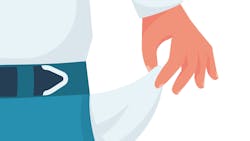As a successful doctor and business owner, you influence people around you. They listen to what you say. But do you listen to what you say? Are you hearing your words and realizing how they affect your own mindset and that of others?
Developed language is arguably one of humankind's greatest achievements, but excuses are an appalling use of this amazing tool. I’ll dissect the language of excuses so you can use words to lead to more productive outcomes.
Most common excuses
According to a New York Post survey, the average American makes six excuses every day to justify their poor decisions.1 Here are the three most common excuses in descending order:
I don’t have time. The concept of time is exceedingly simple: there are 24 hours in a day, we all have exactly that same amount of time, and most adults can choose how they spend their time. Successful people use their time exceptionally wisely, which makes them exceptionally productive and consistently focused on their highest priorities.
Instead of saying you don't have time, be honest with your language. What you really mean is you’ve lost control over your time; you’re unwilling to make the time to do what you’re lamenting you can’t get done, as if it’s no fault of your own. If you listen to those words coming out of your mouth, you will be motivated to take greater accountability for your time.
Conduct a simple time and activity study. You’ll be aghast at how much time you waste in a week. More importantly, you’ll realize you’re choosing (or allowing others to choose for you by usurping your time and attention) to spend time on low-priority activities.
I can’t afford it. As with time, what you do with your money is entirely your choice. This isn't limited to the cash you keep on hand. It also includes what you choose to invest in and how you leverage credit for profitable return.
Whenever someone tells me they can't afford to do something that would benefit their business, I ask about the cost. A typical response is, “I don’t actually know.” Alternatively, their answer is based on assumption or hearsay. When they hear that language come out of their own mouth, they realize that excuse makes no sense. Using this excuse before finding out the actual cost and projecting the return is bad for the business. The “I can’t afford it” excuse precludes you from investigating the possibilities.
Here's an example. A new office sign might cost $50,000–$75,000. Before using the excuse that you can’t afford the sign, do the math. The sign may bring in 10 new patients a month, times $2,000 average revenue per patient, which equals $240,000 a year. Taking the time to run this simple analysis will show that finance payments are affordable, and the sign will likely be a profitable investment decision.
Banish from your language the excuse, “I can’t afford it,” and replace it with, “I ran the analysis, so now I can make an informed decision.” Find out the cost, project the increased revenue, and calculate the long-term return on investment.
I’m too tired. Exacerbated by COVID-19, it wasn’t surprising that the number one excuse for not getting things done in the May 2020 survey was, “I’m too tired.” Overcoming physical, emotional, or mental fatigue requires you to do some soul-searching about your lifestyle, and the changes you need to make are totally within your control.
For example, improving your diet, exercise, social engagement, and spiritual support might put you in a healthier physical and mental state. Blaming inaction on fatigue is an excuse for not taking responsibility for how you feel and not doing what only you can make yourself do to improve your productivity and focus.
More from Jay Geier:
The power of positive confrontation
Invest in training before technology
Explanations versus excuses
The difference between an explanation and an excuse is responsibility; when you make an excuse, you feel absolved of responsibility, as if you have no control and no choice. As a person of influence, you shouldn’t use the language of excuses. Think about the impact it has on others when you regularly lament about fatigue, time, and money. What example are you setting? What kind of a leader are you being?
Scrub your vocabulary. Like going through a car wash, cleanse your mind of the dirt and debris you pick up when you don’t adequately protect yourself from negativity and inaccurate information. Instead of making excuses, say it like it is, and listen to what you’re saying. Changing your language will change your thinking and result in positive outcomes.
Editor's note: This article appeared in the September 2023 print edition of Dental Economics magazine. Dentists in North America are eligible for a complimentary print subscription. Sign up here.
Reference
- Gervis Z. The average American makes this many excuses every day. New York Post. May 28, 2020. https://nypost.com/2020/05/18/the-average-american-makes-this-many-excuses-every-day/
About the Author
Jay Geier
Founder, Scheduling Institute
Jay Geier is a world authority on growing independent practices. He is the founder and CEO of Scheduling Institute, a firm that specializes in training and development and coaching doctors on how to transform their private practices into thriving businesses they can keep for a lifetime of revenue or sell for maximum dollar. To hear more, subscribe to Jay’s Private Practice Playbook podcast at podcastfordoctors.com/dentec.
Updated February 15, 2023
